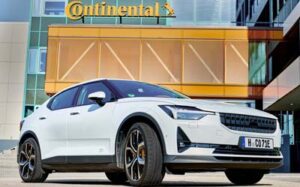Continental’s Net|Zero|Now immediate action program offers customers carbon neutrality
Hanover, Germany – With its Net|Zero|Now immediate action program to mitigate climate change, Continental is offering its customers the opportunity to achieve carbon neutrality for their business with the technology company along the entire value chain today. The aim of the program is to enable customers with ambitious sustainability goals to neutralize the currently remaining “carbon backpack” of their relevant business with Continental. This carbon backpack includes all emissions generated by processes at Continental and its suppliers as well as following end of use, but does not include the customer’s use phase and emissions. The carbon backpack is offset by an equal quantity of so-called negative emissions. Net|Zero|Now complements the reduction measures implemented by the company to date and sustainable innovations such as the Conti GreenConcept tire, which are designed to achieve carbon neutrality in line with the Paris climate agreement today.
Net|Zero|Now immediate action program offers customers carbon neutrality for their business with Continental along the entire value chain
The focus of Net|Zero|Now is on Continental products and systems used in emission-free vehicles – from electric cars to hydrogen-powered buses and streetcars. Continental generated sales of almost €1 billion with emission-free mobility in the past fiscal year. The 10 highest-volume electric vehicle brands worldwide in 2021 all placed their trust in Continental technology. The program means that for these vehicles, zero-emission mobility is already possible when it comes to the share of CO2 emissions attributable to Continental. Not only are they emission-free during their use, but the value chain relating to Continental is also carbon-neutral. Furthermore, Net|Zero|Now is immediately available for the combustion-engine-vehicle and industrial business, thus helping companies meet the increasingly ambitious carbon neutrality targets on the market.
“2021 in particular, with its devastating floods and forest fires, showed that climate change mitigation needs to be accelerated. We must use every means available to implement measures faster,” says Dr. Ariane Reinhart, Executive Board member for Human Relations and Sustainability at Continental. “At the same time, we must seize the opportunities associated with this transformation together with our partners.”
Continental sees Net|Zero|Now as an important blueprint for other companies to better achieve the goals of the 2015 Paris climate agreement alongside ambitious reduction efforts and neutralization measures. Growing regulation and market requirements are increasingly leading to ambitious climate targets among companies. “Reaching net zero is the benchmark here. And for that, we need appropriate economic incentives as well as more courage. To date, for example, carbon neutrality has not been taken into account in the VAT rate,” explains Reinhart.
Continental’s approach with its immediate action program for climate change mitigation relies on the principle of negative emissions and therefore goes beyond conventional carbon offsetting. In mathematical terms, this means that no more emissions are generated for each product in the supply chain than are removed again from the atmosphere, for example through reforestation. On balance, net zero is thus achieved and there is no longer any burden on the climate. The Intergovernmental Panel on Climate Change, which focuses on accelerating carbon dioxide reductions, is increasingly recommending negative emissions in order to meet the goals of the Paris climate agreement.
Continental is working with recognized partners on high-quality and certified ecosystem restoration and reforestation projects in order to remove the appropriate quantities of CO2 from the atmosphere. It selects only projects that are certified according to international standards. Social aspects, the sustainability of reductions, such as safeguards in the event of forest fires, and other quality criteria also play an important role in the selection process.
Sustainability is firmly anchored in Continental’s corporate strategy as a key driver of innovation. The company’s sustainability ambition comprises four focus areas: carbon neutrality along Continental’s entire value chain, emission-free mobility and industry, a circular economy and responsible value chains. Continental aims to fulfill its ambition by 2050 at the latest. Achieving carbon neutrality throughout the value chain as well as its other goals, however, are not Continental’s responsibility alone. They can only be attained jointly with customers, suppliers and other partners.

